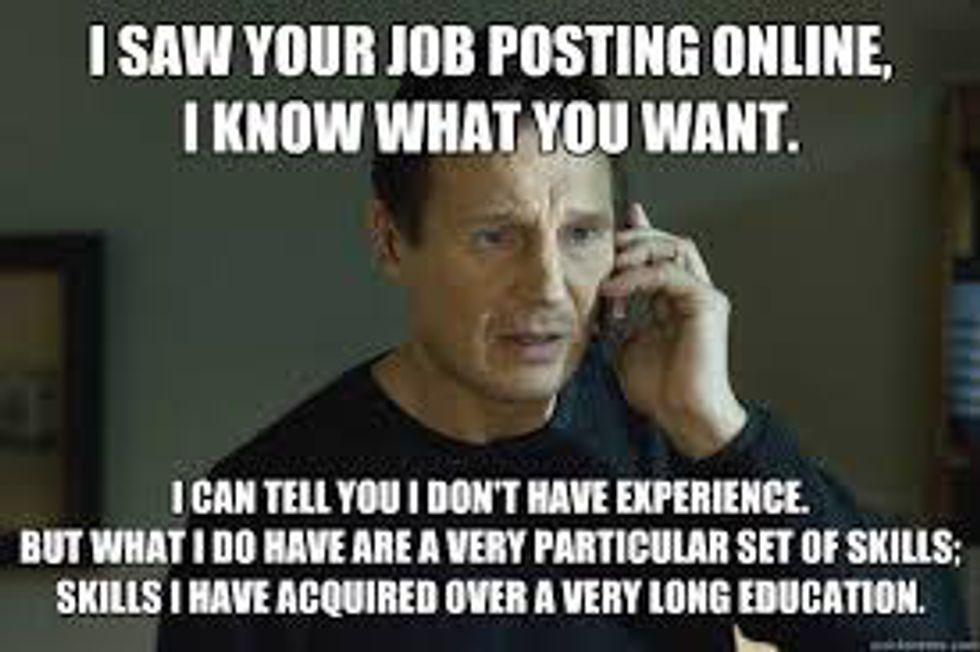As senior year approaches, hundreds of thousands of seniors will move into college for the last time in their four years of youthful bliss. When move-in ends, so too does the job, grad school and career search begin. It typically begins with a college-sponsored career fair. Hundreds of college seniors will be suiting up and dressing up to go make that first impression with a booth in a college’s gymnasium or event hall. Some underclassmen will wander around the booths with a blank stare on their face, but you are a senior; time is running out for you, and you are armed with resumes, business cards and your LinkedIn profile. Pressure is building from your mother and father on finding a job and you feel it in the back of your head.
Depending on your major, you should be set for a job in the corporate world without a hitch. But what if you a political science major?
When I was that wide-eyed freshman walking through my first career fair three years ago, I didn’t see many booths that offered government position in the bureaucracy, legislatures, trade associations or lobbying groups. It was all geared toward business, health policy, grad schools, non-profits and education fields.
My message to my fellow political science majors: Do not fear! Opportunities are out there; you just got to look closely.
Over my experience this summer, I realized that there are thousands of opportunities for political science majors, especially in the political science heartland of America: Washington, DC. Even if you aren’t dead set to move down to DC in the summer, here’s a guide to help nail that first job in your dream field:
1. Internships!
Nothing says something more than working as an intern. Senior year is the year to make you stand out amongst the crowd. While many government agencies don’t offer paid internships, the experience and the connections you make at your internship site will eventually help with strengthening your resume. If you live near a state capital or a major city, there are bound to be offices and agencies that will offer an internship.
2. Arm yourself with the right tools.
In addition to work experience comes the most important weapons in your job-seeking arsenal -- business cards, LinkedIn profile, resume, letters of recommendation (for later applications) and writing samples are all valuable in a competitive jobs market.
3. Subscribe to job posting sites specific to government agencies or sectors.
There are countless websites that specialize in career fields and areas of work, ranging from Capital Hill to non-profit work to campaign postings and more! All it takes is finding these sites. To get you started, check out this website and make your profile and find the agency that best suits you!
4. Make a list of fields you see yourself working in.
It’s senior year. By now you should have an idea of where you see yourself working. While this may be a straight path now, the pathway to working in government or in a political science related field will have many different pathways of getting to where you want to be.
5. Carry yourself professionally.
It’s easier than you think for employers to bypass security settings on your social media accounts. If they see a picture of you from freshman year at that party and you have a red solo cup in hand, more than likely they may give a pass on your application. Carry yourself well.
6. Build your network.
Every connection, business card and person you interact with could be a valuable resource for asking questions or ask for availability in an office. It can be someone from a staffer to a director of an office or a lobbyist. Sometimes it's not a matter of what you know, it’s a matter of who you know. Plus, your network will have people who have gone down the same road as you before, giving, even more, advice!
7. Timing.
With a presidential election this year, there will be plenty of shuffling and turnaround in all aspects of government with the new administration beginning in 2017. Take advantage of this time and be keen on openings and opportunities.
8. The 11th commandment: Thou shall follow up with a thank-you note or email 24-hours after a networking meeting.
In a world where thank yous are all but forgotten, be the person that follows up with a sincere note of thanking the person for their time and giving appreciation for their guidance.
9. Don’t miss an opportunity.
If there’s ever a chance to meet any political science alums or professionals at a networking event, don’t hesitate to go! Don’t hesitate either to ask if you could grab coffee with a professional you met and ask them questions about how to get to where you want to be, as well as to ask their advice. It never hurts to ask!
10. Internships lead to jobs.
Again, Internships are extremely important. As unpopular it may be, this is sometimes the only means to get your foot in the door. After college, there will be a time where you need to take an unpaid internship and get more experience. Sometimes, an internship can lead to a job offering in a week’s time to a month’s time!
And just like that, you're set!


































